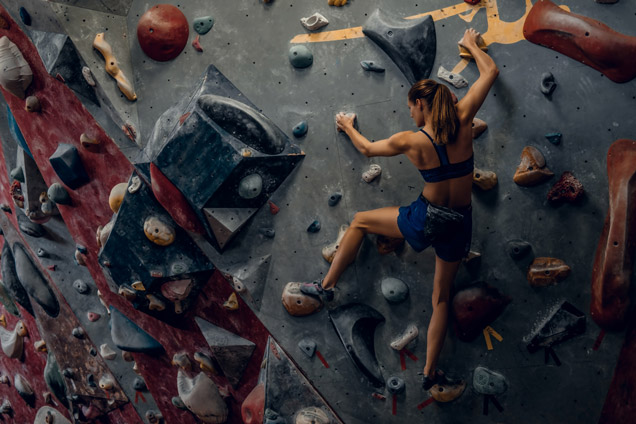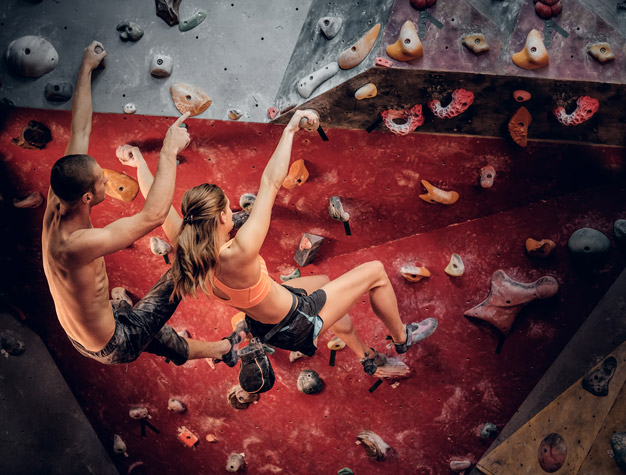Being the most powerful and dynamic form of rock climbing, bouldering is the ideal full-body workout. And yes, bouldering does work out the entire body. Aside from the obvious muscles such as the back, shoulders, and arms, bouldering also targets the core and legs.
Bouldering offers a fun way to improve your body, while also improving your mind, confidence, and reducing stress levels. In a way, bouldering offers everything a conventional gym membership can offer, packaged as a fun social activity with many extra benefits.
Bouldering might be considered a niche sport still, but its growing in popularity every day.
In this article, we’ll cover why bouldering is the ideal workout.
Bouldering is a full-body workout
As aforementioned, bouldering targets about every muscle in your body. This makes it a very well-rounded sport to partake in.
According to WebMD, bouldering targets the following muscles:
- Core
- Forearms & upper arms
- Shoulders & back
- Glutes
- Legs
Bouldering 2-3 times a week can form an alternative from going to a conventional gym 2-3 times a week.

I would even argue that bouldering x times per week is better than hitting a conventional gym for the same period. Now I have no scientific evidence to back this up, but that has been my experience. Before I started bouldering, I was a sporadic gym goer. Meaning I would show up 3 times a week after signing up and from then on whenever I wanted.
Once I got into bouldering, you couldn’t get me out of the bouldering hall. This is because unlike conventional gyms which are filled with boring machines, bouldering is fun.
Bouldering offers a sense of progression through its grading system. That yellow boulder problem you couldn’t finish in your first session might be your warmup some day. You feel like you are constantly improving your climbing skill while at the same time you are working out your body.
Another fun element about bouldering is that while you’ll probably start bouldering indoors, you have the chance to take your climbing skills outdoor on real boulders as well.
I know plenty of climbers that abandoned regular gyms in favor of bouldering halls (As well as the occasional tryhard that hits the gym to climb even harder).
If you haven’t given bouldering a shot, you should. I guarantee you will enjoy it and if you don’t whats the harm? Us climbers all regret trying it out too late, don’t wait.
Is bouldering good for building muscle?
Absolutely you will see muscle gains from bouldering. Personally I saw improvements in my physique just a couple of months into bouldering. My shoulders and back muscles were the first to show signs of change. Following my first year of bouldering, I noticed immense changes in my core, growth in my forearms and most notably my back had changed shape.
Being one big workout for the back, core, arms and legs, bouldering is undoubtedly going to show signs of change for you as well. And aside from the physical changes, you will feel stronger as well.
That being said, you will not get big from bouldering.
Bouldering is not all powerbased, especially at the initial grades. Beginner & intermediate bouldering grades can be done purely on technique alone. Whether you use technique over power, depends on your climbing skill and style of course.

Bouldering cannot be compared to bodybuilding where one is constantly pushing their bodies boundaries using heavy weights in low volume sets. In the muscle-building department, bouldering more closely resembles calisthenics or other forms of ‘bodyweight excercices’.

That’s why you’ll notice that most climbers look lean, or skinny even.
Even an amateur bodybuilder of 2 years will look bigger than a professional climber (they won’t be stronger though) but they will appear stronger with big arms, huge pecs and massive quads.
In addition to having strength, climbers also have to be light. That’s why in climbing you’ll often hear the term ‘strength-to-weight’ ratio. This is a term hardcore climbers can really obsess about. Being strong while also maintaining a light weight makes a big difference at the expert levels of climbing.
Is bouldering good for weight loss?
Bouldering can absolutely help you lose weight. Research from Dailyburn suggest a single hour of climbing can burn between 500 and 900 calories. So an average climbing session has the potential to burn between 1000 and 1800 calories. Combined with a healthy diet, bouldering should result in some weight loss.
Keep in mind though that bouldering also builds muscle so some of your weight loss might be cancelled out by the fact that while you are burning fat, you are also building muscle.
Other reasons bouldering is good for you
Bouldering is so much more than a fun physical activity that happens to work out the entire body. Here are some of the benefits of taking on bouldering as a hobby.
Bouldering challenges your mind
Routes for boulders are short and require a specific solution (known as beta) to complete. For this reason, boulder routes are referred to as ‘boulder problems’. Comparable to math problems, you need to find the solution to solve a boulder problem.
This problem-solving nature makes bouldering an engaging and challenging physical activity to partake in. Much of bouldering is a mental puzzle. To succesfully top out, you don’t just have to be a strong climber, you have to be able to put the pieces together as well.
Your mind is engaged not only whilst you are on the wall but also before and in between attempts.
Bouldering can reduce stress & anxiety
Bouldering has always felt like meditation for me. When I’m at the bouldering gym, work doesn’t exist. For those 3 – 4 hours (yes my sessions are long) I am transcended from reality. No emails are checked, the only troubles on my mind are boulder problems.
Afterwards, on the bike ride home as well as the rest of the evening, I’m zen. Bouldering has always been a huge source of stress and anxiety relief for myself.
This sport is all-consuming. You can’t think about anything else while you are on the wall. You are focusing on holding body tension, figuring out the next move, trying not to fall off. There is simply no time to think about anything else.
Not only does bouldering aid in stress-relief, it can also help against depression. Researcher from Germany found evidence to suggest that bouldering can improve symptoms of depression even when considering the person initial level of excercice.
Bouldering is a social activity
Bouldering may be defined as a ‘solo’ form of rock climbing as you don’t need a partner to belay you on a route, but that doesn’t make it any less social. In fact, I find bouldering to be the most social form of rock climbing.
With the routes being so short, the wall, and its boulder problems are shared between climbers. It isn’t uncommon for multiple boulderers to be trying out the same boulder problem. This can result in a scenario where climbers, even if they are complete strangers, are searching for the solution together. And naturally, they will get talking. Before you know it, names are exchanged and beers are consumed in the bar afterward.
I can’t recall a single bouldering session where I wasn’t approached at least once. Long not every encounter turns into a lifelong friendship but bouldering is undeniably social. More so than any other sport I’ve ever participated in.
Additionally, bouldering halls tend to have a lot of regulars which results in everyone knowing each other. If you go occasionally, you are bound to know quite a few people by their name!
Final thoughts
Bouldering is not only a great full-body workout that targets most of your muscle groups, it is also a fun activity that comes with plenty of benefits such as challenging your mind, reducing stress levels, and giving you access to a social community.
All-in-all, bouldering is a phenomenal sport. You won’t get it big from it but you will look good, feel strong and most importantly you will feel good.


More on Bouldering
